Plato’s Education Philosophy
Any discussion of classical education ought to begin with Plato, the ultimate philosopher and the first thinker on education theory and philosophy that we have written material from his own hand. This guide to Plato’s theory of educational philosophy will not be merely theoretical, but practical for all educators, including homeschool moms. Plato’s education theory is where our study of classical education should begin.
Ironically, Plato was not as abstract or difficult a writer as modern education theorists tend to be. We can learn not only from his words, but from his style, how to be educated and how to educate.
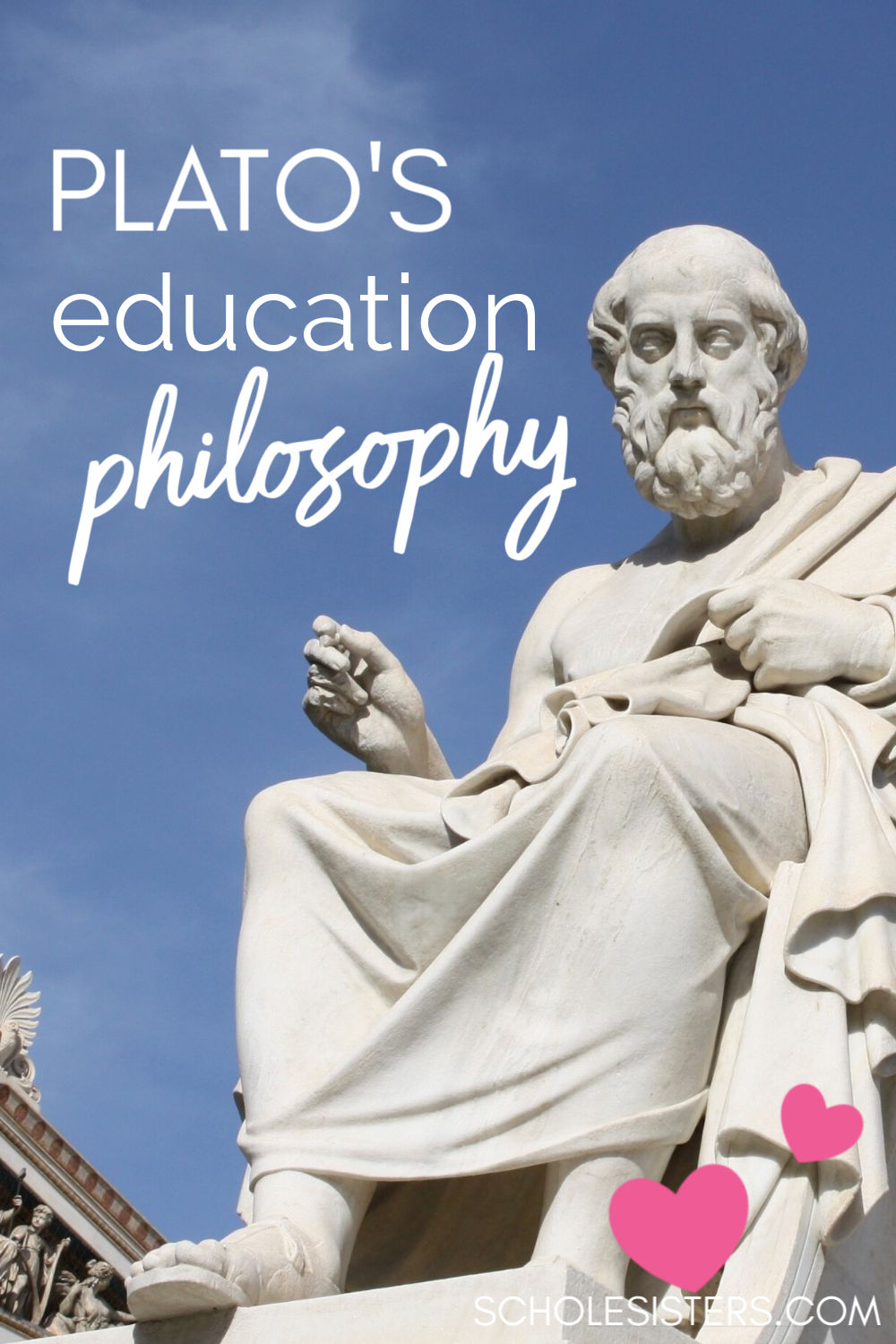
Who was Plato?
“The philosophical tradition in classical education, however, begins with Plato.” Thus writes Richard Gamble in The Great Tradition.
Plato – an Athenian – had been a student of Socrates, and made Socrates his primary mouthpiece in his famous dialogues. Founder of The Academy, where Aristotle would study under him, Plato was a prolific writer. And, in most of his writings, he brings the conversation around to education. It appeared to be a topic never far from the top of his mind, a topic always relevant. His opinions would shape the aims, ideals, and manner of education in Western civilization forever after.
Werner Jaeger summarized Plato’s vision of education: “Education is not the cultivation of certain branches of knowledge…the real essence of education is that it enables men to reach the true aim of their lives.”
Whatever effort fails to do this, is effort spent in vain.
A great beginning source to learn more about the life and influence of Plato is David Deiner’s book, “Plato: The Great Philosopher-Educator,” published by Classical Academic Press.
The primary source for the following article are the excerpts from Plato’s Republic and The Laws found in Richard Gamble’s work, “The Great Tradition: Classic Readings on What It Means to Be an Educated Person.”
The Aims of Education According to Plato
We need to reorient ourselves to words that have different connotations to us than to Plato if we’re going to wrap our heads around what Plato’s education aims are.
His goal is to create and train philosophers.
Today, that seems like we’re saying his goal was to train useless thinkers, but that has not been the historic and certainly not the ancient perspective. After all, philosopher means lover of wisdom, seeker of truth.
Education is the process of showing people how to rightly love, know, and seek truth and then apply it wisely and virtuously in real life situations. Philosophy, to Plato, necessarily involves application, applied virtue in all of life. It is not knowledge for knowledge’s sake, but rather knowledge for rightly ordered living. But, he would say, there is no rightly ordered living where there is not true knowledge – that is, knowledge of what is true and good and beautiful.
Philosophical minds, according to Plato, always love knowledge that shows them the eternal nature of reality, things that don’t change from generation to generation. Those who “wander in the region of the many and the variable” are not philosophers at all, regardless of what they claim, according to Plato; and we see hear the beginnings of the principle of multum non multa: more is not better, but only quality ought to be valued.
A philosopher, indeed, is one who has a taste of every sort of knowledge – the knowledge is not limited but broad. He is curious to learn and is never satisfied with the knowledge he’s attained, but always desires to learn more. Yet this is not an idle curiosity into novelties, but rather stems from a love of the vision of truth.
So we see that multum non multa is not about few subject areas, but rather about the focus of our attention, the quality of our resources. We should not spend time and attention on passing fads, on pure speculation, or on worthless things but on timeless truths and tested beauty. In Plato, we see again and again a contrast between the eternal and the variable or the fleeting. When choosing, a philosopher chooses the eternal, every time. You will know a philosopher by his choices.
And so we can see here why the early Church Fathers, the medieval masters, the reformers, and many other Christian educators through the ages have kept studying and applying Plato, for what is the vision of truth but knowledge and love of God?
John of Salisbury, in the twelfth century AD, wrote:
If, indeed, according to Plato, the philosopher is one who loves God, what else is philosophy if not the love of the divine?
– John of Salisbury
So, as educators, let us not shrink from nor shirk our role in being philosophers and training philosophers. This is our life work.
Plato’s Theory of Education
Education consists primarily of ordo amoris, of rightly ordering and training tastes and loves. Ultimately, as seen above this is cultivating a love of truth. Plato insisted that a love of truth would crowd out vice, including the desire for pleasure or profit. One who loves truth will have no tolerance for falsehood, by definition.
The Cave: What Education Is
Probably the most famous and well-known of Plato’s works is his Allegory of the Cave, found in Book VII of The Republic. If you’ve never read it, get of IG, ask your phone to find it for you on the internet. It’s not long, and it’s a story that’s been inspiring educators for millennia.
In the end, Plato explains his point straightforwardly: “Our argument shows that the power and capacity of learning exists in the soul already; and that just as the eye was unable to turn from darkness to light without the whole body, so too the instrument of knowledge can only by the movement of the whole soul be turned from the world of becoming into that o being, and learn by degrees to endure the sight of being and of the brightest and best of being, or in other words, the good.”
The ability to learn and to know is innate in humans, not a skill we have to teach. Rather than “putting knowledge in the soul like sight into blind eyes,” teachers are more like evangelists, pointing people to the light we’ve received. Plato says we stand in need of conversion before we can perceive the truth, and thus he was more right than he knew. Eric Voegelin summed up Plato’s vision of education as “the art of periagoge, of turning around,” that is, of repentance.
Without the willingness to admit fault, admit lack, admit you might be wrong, admit you don’t know it all, you can’t receive truth. You aren’t even turned toward truth. A humble turning must be an indispensable part of the learning process.
One of Plato’s applications of his allegory was also to point out the duty of those who have seen, known, experienced truth. They bear a responsibility not to stay forever transfixed in realms of light and glory (no perpetual students or ivory towers here), but rather to return to the cave and attempt to free others, though he will often be rejected and scorned. Though he would be personally happier to remain in pure contemplation, his love of truth is required in active service in his community for the society to be happier.
So, again, we see that philosophy is never meant to remain in our minds, but to come out in active service and application in our real world responsibilities.
Plato believed women should be educated
The question of whether or not women should be educated, or what type of education women should receive, is not a modern one, but a timeless one. It is a question about humanity. What is a woman? If she is human, she, too, ought to be educated. Plato’s education plan includes women:
Women ought to share as far as possible in education and in other ways with men.
– Plato
He says that if we are educating for happiness and for political stability, then we ought not leave out half the population. If we say education is for human happiness and then don’t educate women, we are saying that women are a different order of being. Plato says there’s no reason not to seek a fully blessed, fully educated society, a society with educated women as well as men.
My law would apply to females as well as males; they shall both go through the same exercises.
– Plato
He claims this because education, in his mind, is not about production. It is not about training for occupations. It is about developing human abilities and happiness more broadly. Plato fully acknowledges that women have a different role in society than men, but establishes that their role requires no less education. Women are, he says, “hard at work weaving the web of life, which will be no cheap or mean employment.”
Plato wanted compulsory education
Plato did not believe that education was for the few, but for all free citizens. Of course, his view excludes barbarians and slaves, yet his view is more expansive for his time than many before or after him.
He believed that because education benefits all society and is necessary for stable, virtuous government, then the government ought to pay for and manage education.
The children shall come not only if their parents please, but if they do not please; there shall be compulsory education, as the saying is, of all and sundry, as far as is possible.
– Plato
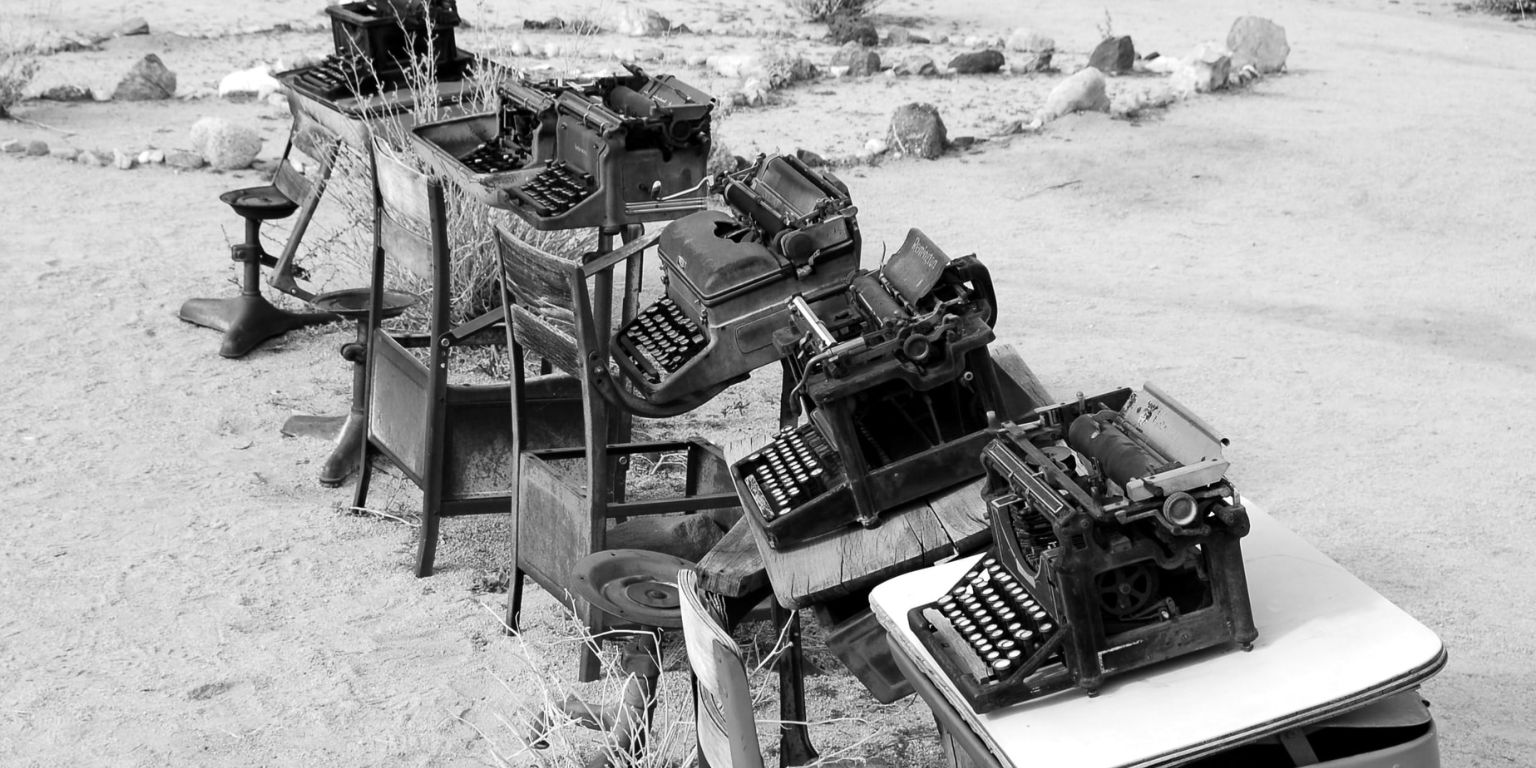
Early Childhood Education in Plato’s Philosophy
So often it is the mothers of three-year-olds, maybe five-year-olds, who are most concerned with educational principles and theories and practices. Plato would encourage us in those concerns, not pat us on the head and poo-poo our earnest desire to do right by our children from the very beginning.
However, what he would have us do is counter-cultural in our current world of early academics and “head start” programs. What will best set the stage for a complete education is well-directed play, Plato taught.
Preschool: “Right training in the nursery”
The most important part of education is right training in the nursery. -Plato
When we think about educational philosophies, theories, and curriculums, we must not forget the basis, the foundation.
Any education – whether the intent is to homeschool or not – begins with a toddler learning to come when called, pick up his toys, and obey his mom and dad. Everything that comes after is built on that first practice at submitting to authority and exercising self-control.
No matter what educational methods or settings you choose, this very early beginning is essential and cannot be neglected.
Children’s games & traditions
Plato’s education plans began with small children because that is when tastes and habits are formed, not because that is when they need to begin formal academic studies.
Anyone who would be good at anything must practice that thing from his youth upward. -Plato
What would school look like for a 3, 5, 7 year old, according to Plato? It would look like playing: “The teacher should endeavor to direct the children’s inclinations and pleasures by the help of amusements, to their final aim in life.” Play is formative. Play matters. Play and home life forms tastes, desires, expectations, and standards.
“The soul of the child in his play should be guided to the love of that sort of excellence in which when he grows up to manhood he will have to be perfected.” Play isn’t irrelevant. What will our children need to know, need to love, as adults? Let their relationship with those things begin pleasantly in childhood.
Academics begun early do not help anyone reach the aim of education more surely or more quickly. However, right training and right affections and right amusements built up in early childhood will pay off.
What children need to learn, according to Plato
Plato summarizes the responsibility of parents and tutor in training children like this:
We must learn to obey. This begins with obeying parents and teachers, but extends as adults who know how to obey the law, obey God, obey their conscience, obey those in authority over them.
We must also learn to rule. This begins by learning to rule ourselves, which is self-control. Then is extends to learning how to govern those under our care justly and lovingly.
One who rules without obeying is a tyrant, one who obeys without ruling is a slave.
And both truly all begins when young children learn to obey, because that requires the beginnings of learning self-control.
Related: Dear homeschool mom who wants to give her 5-year-old a classical education

Plato’s Curriculum
How should we divide subjects? Plato: “Education has two branches – one of gymnastic, which is concerned with the body, and the other of music, which is designed for the improvement of the soul.”
Have you ever considered your whole day as one of studying music, with brief interludes of bodily training? Music – those things of the muses – includes the major branches of knowledge. Plato doesn’t divide them, but unite them, as one study meant to feed and develop the soul.
A worthy soul ought to have a worthy, controlled, agile body as well, so gymnastic is a necessary part of education, not an extracurricular. Of exercise, Plato writes: “working with energy and constancy, with composed strength, and for the sake of health – these are always useful, and are not to be neglected, but to be enjoined alike on masters and scholars.”
What gymnastic to you enjoin on yourself and on your students? Plato reminds that it “aims at preserving dignity and freedom” and “producing health, agility, and beauty.”
How are your musical studies going? Not the study of music per se, but all your studies as studies that are done for the soul’s improvement.
Plato on Life-long Learning
We don’t have to teach out of our own sufficiency and our own mastering of the subject.
Contrary to what many classical school marketing materials will tell you, we don’t have to be a master before we begin to teach. However, according to Plato, we do have to be willing to outlay both our time and money to pursue education for ourselves if we want our children to be educated. We also can’t teach from complacency.
But I cannot advise that we remain as we are.
Plato
Notice how Plato here includes even himself in this advise. He sets the example. He continually pursues education, growth in wisdom and knowledge, whether others regard him as a master or not.
Every one of us should seek out the best teacher whom he can find, first for ourselves, who are greatly in need of one, and then for the youth, regardless of expense or anything.
Plato
Plato is speaking to teachers but also to his general audience. None of us should remain as we are, but instead seek out teachers. We should seek out teachers for ourselves before we seek them for our children.
Mothers, homeschooling or not, must be both teachers and learners.
As mothers home with our children, we are their primary influence, especially in the younger years. We can’t just wing it and expect great results or satisfaction.
If we can be always learning, always growing, always stretching, we will be happier and we will be modeling for our children the life we’re asking them to embrace.
Scholé Sisters Podcast Episodes on Plato
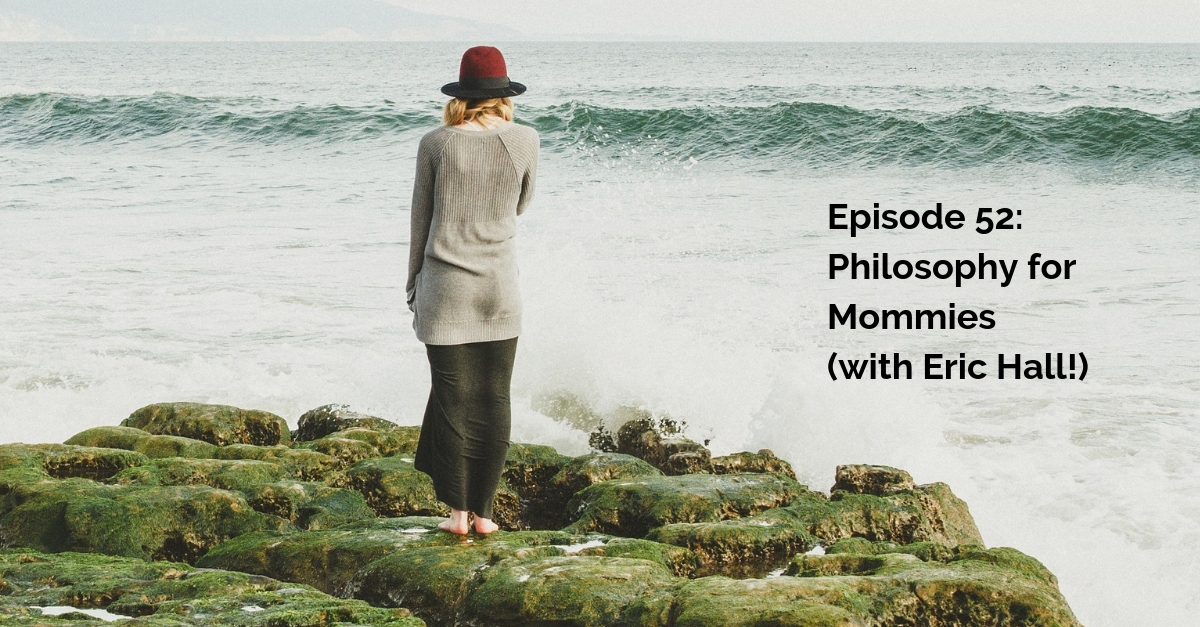
Episode 52: How to study philosophy – and love it!
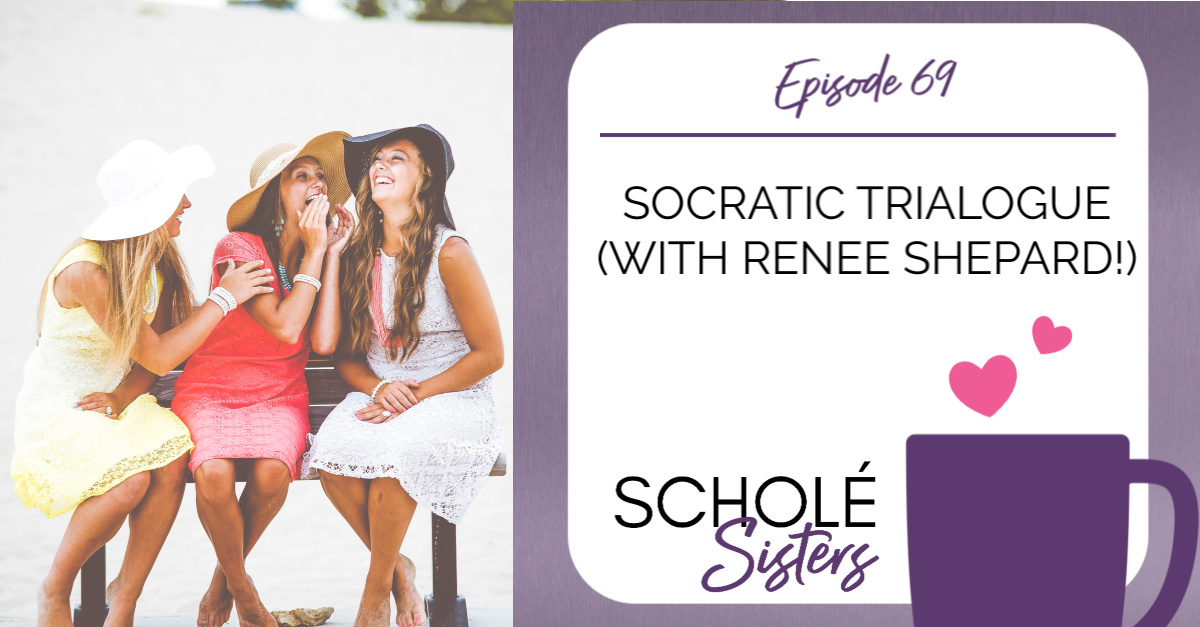
Episode 69: A chat on Socratiic Discussion based on Plato’s Gorgias
Scholé is the opposite of stress.
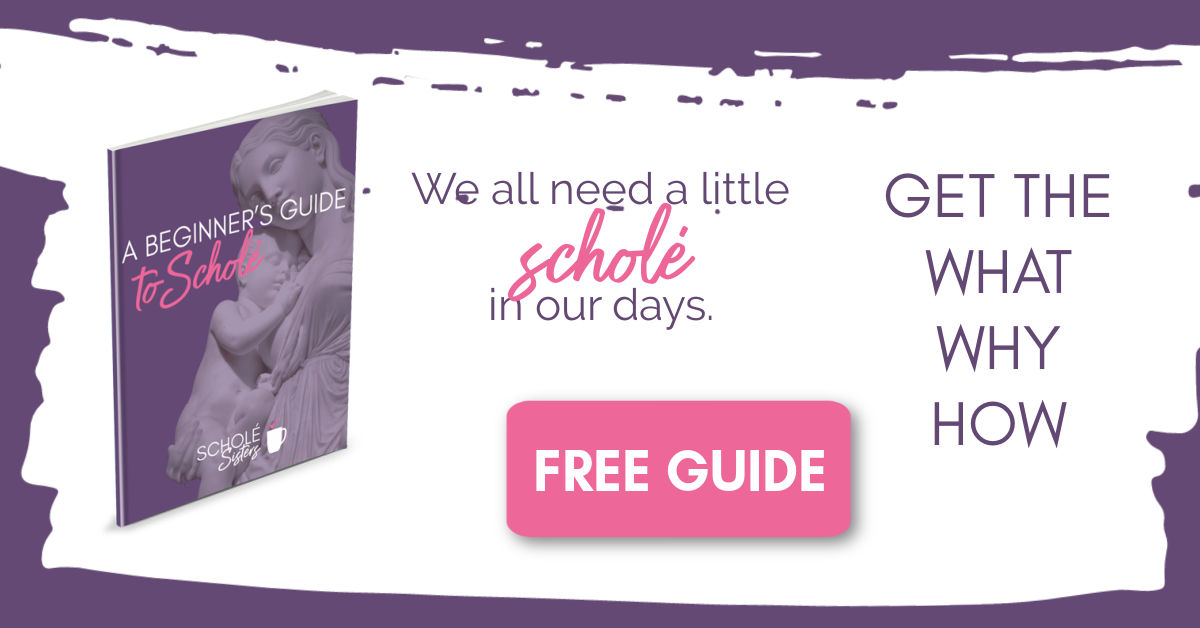

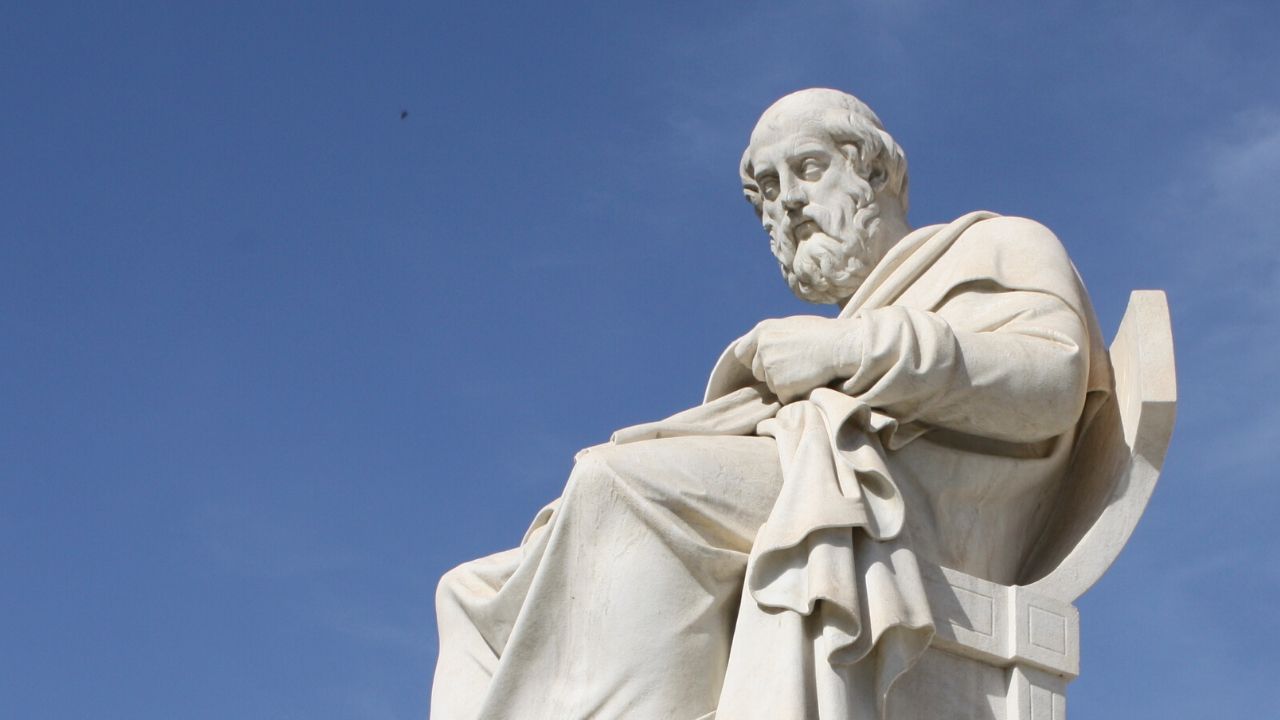
One Comment
Comments are closed.